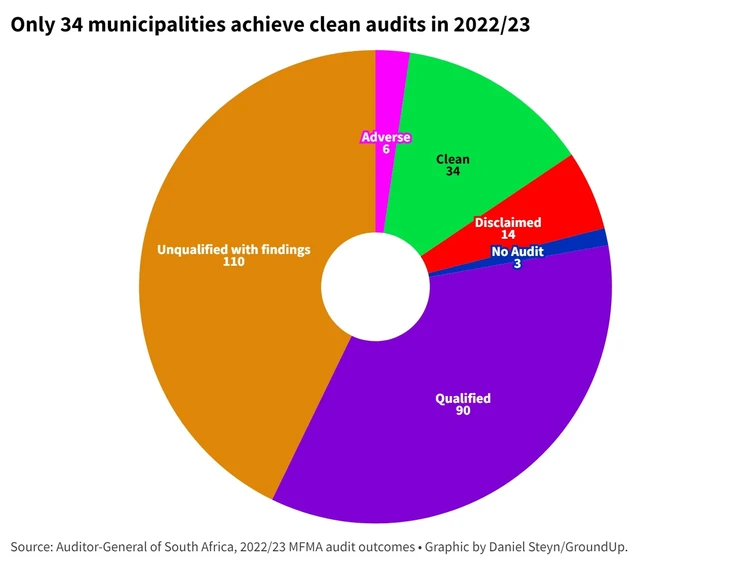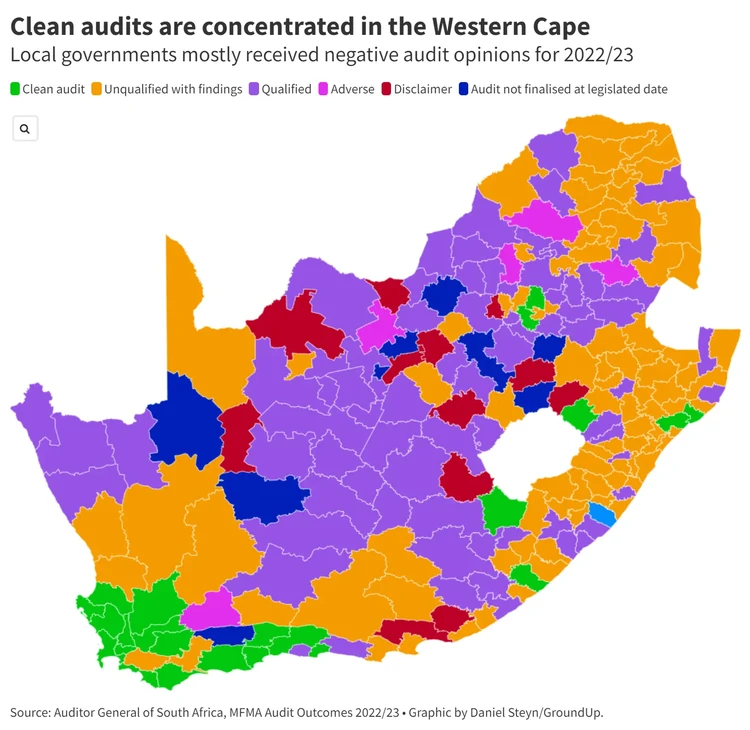Alarming Auditor-General report on municipalities
Only 34 out of 257 municipalities receive clean audits for 2022/23
Poor audit outcomes show the lack of skills, stability and discipline in municipalities, the Auditor-General of South Africa Tsakani Maluleke told Parliament’s Portfolio Committee on Cooperative Governance and Traditional Affairs on Tuesday.
Maluleke was tabling the local government audit outcomes of the 2022/23 financial year. She announced that R3.4-billion of infrastructure grants had gone unspent and R7.4-billion had been lost to fruitless and wasteful expenditure - up from R4.9-billion in 2021/22. The audits also revealed R24.1-billion in unauthorised expenditure.
Infrastructure projects were often beset by project delays, cost overruns or poor-quality construction work.
Of the 257 local and district municipalities, only 34 achieved a clean audit for 2022/23, down from 38 in 2022/23.
Maluleke complained about the lack of skills, discipline and stability in municipalities, which affect their ability to prepare financial statements and plan for and report on services.
Municipalities over-rely on consultants, although improvements have been made in this regard, Maluleke said. R1.4-billion was spent on financial consultants in 2023/23, down from R1.6-billion in 2021/22. She added that municipalities that achieve clean audits spend much less on consultants.
Maluleke said there is “no reason” why a Chief Financial Officer and their team should not be able to compile credible financial statements.
“If you set a culture where they continue to get away with that, then you’ll not be able to build an institution of strength or integrity,” Maluleke said.
Clean audits are mainly concentrated in the Western Cape, Maluleke said. Improvements have been seen in the Eastern Cape and KwaZulu Natal, but in the Free State and North West, there is a “drought of clean audits”. Municipalities in these provinces also tend not to submit their financial statements, Maluleke said.
The City of Cape Town was the only metro municipality with a clean audit. The City of Ekhurhuleni had a clean audit in 2021/22, but slid back to “unqualified with findings” this year.
Altogether, 110 municipalities achieved “unqualified audits with findings”, meaning that by the end of the audit process their financial statements were credible but the Auditor-General had concerns about service delivery reporting and compliance.
A total of 90 municipalities received qualified audit opinions, and are unable to account for revenue due to incorrect billing or because they can’t tell who owes them money. In many cases, expenditure and irregular expenditure could not be fully accounted for.
Six municipalities received adverse audit opinions, meaning their financial statements cannot be relied on.
Fourteen received disclaimed audit opinions, meaning that insufficient documentation was provided for the Auditor-General to form an opinion. The number of disclaimed audit opinions has decreased over time, from 28 at the start of the administration, Maluleke said.
She commended provincial governments across the country who have stepped in to help municipalities move out of disclaimed status. She said there is a “direct line” between disclaimed audit opinions and dysfunction, which affects service delivery.
Maluleke said interventions by the Auditor-General to identify and resolve material irregularities had resulted in the recovery of R262-million in financial loss and the prevention of R218-million in financial loss. R444-million is in the process of being recovered, Maluleke said.
The interventions include helping to improve internal controls, ensuring responsible officials are held to account, and instituting fraud and criminal investigations.
Support independent journalism
Donate using Payfast

Don't miss out on the latest news
We respect your privacy, and promise we won't spam you.
Next: Farm workers march in rain and wind to call for ban on pesticides
Previous: Hijacked building fire survivors say their new living conditions are unbearable
© 2024 GroundUp. This article is licensed under a Creative Commons Attribution-NoDerivatives 4.0 International License.
You may republish this article, so long as you credit the authors and GroundUp, and do not change the text. Please include a link back to the original article.
We put an invisible pixel in the article so that we can count traffic to republishers. All analytics tools are solely on our servers. We do not give our logs to any third party. Logs are deleted after two weeks. We do not use any IP address identifying information except to count regional traffic. We are solely interested in counting hits, not tracking users. If you republish, please do not delete the invisible pixel.


